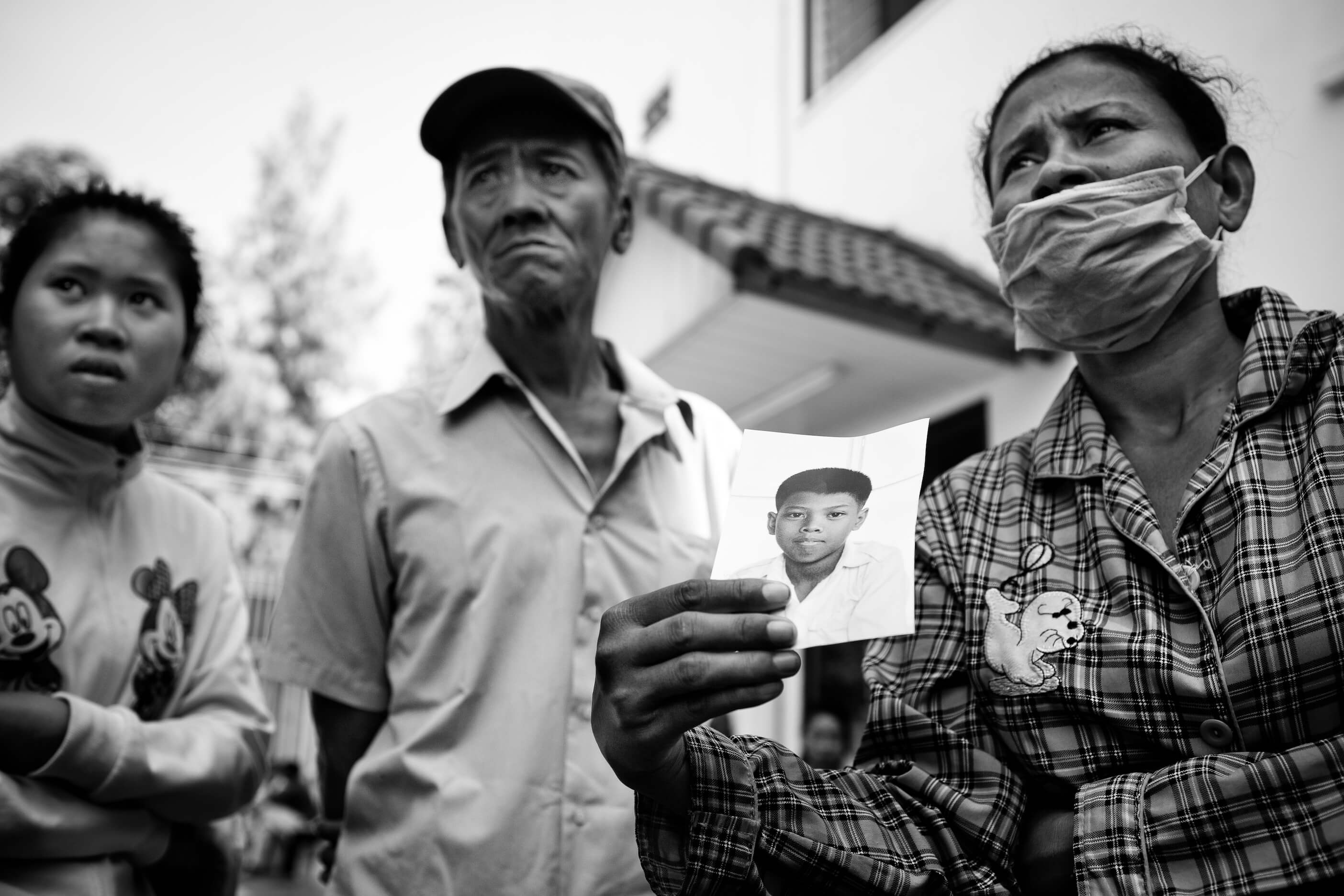I’ve just returned again from one of my favorite cities and the capital of Cambodia, but this time on a much lighter-hearted travel article, in opposition to my last visit in late November when the scenes you will see below transpired. When I captured and instantly filed them, I knew I would need to revisit the images, to spend much more time with them; both to try to bring out all the feeling that I felt was held in each one, as well as to deal with my own thoughts regarding what had happened, and what I had seen.
It was November 22nd 2010, the last night of the annual water festival, and revelers gathered on the newly built Diamond Island, which lies in the middle of the river in the heart of the city. The thousands in attendance, mostly rural residents from outlying provinces, were sparked by a still unknown event, and all tried to escape the island over the main bridge connecting it to the mainland. Some theories proposed electrocution, others that several people fainting cause the mass evacuation, but perhaps the real cause may never be known. Irregardless of the reason though, nearly four hundred people, mostly women and children, perished, and many more were injured and devastated by loss. What follows are a few of the images that I captured in the aftermath of this tragic event.
This is the site where the events occurred as I visited the following day. The brand new bridge remains fully intact, dispelling the myths that a collapse had sparked the events.
I began the day in the Calmette Hospital, where many of the victims had been taken. Upon arriving, there were four yet identified; one’s family arriving just after I did. Above, several family members of a young female victim prepare themselves to enter the hospital’s mortuary to identify and claim her body.
Upon viewing, and recognizing her face, loved one’s emotions are handled in different ways.
Police and medical staff gather as another young female victim is embalmed, now nearly forty-eight hours after. She was never claimed in the several hours I spent in this mortuary.
Onlookers watch as a police officer, using force to make them pliable, takes the final fingerprints of a female before she closed in the body bag and rested in her coffin for transport to her hometown.
Just outside the hospital, a woman reads the newspaper with headlines and images of the previous day’s tragic events.
The sister of a female victim has her last moments with her as she is sealed in the coffin and prepared for transport.
Cambodia is a predominantly Buddhist country, and as such, monks are very highly revered members of society. Here, one records some of his brothers as they give the final rights, as it were, to a victim and her loved ones.
A sign outside the hospital, in English, describes the procedures on offer by a local mortician.
A woman throws rice in offering as a government provided truck carries the body and family of the young female victim back to their hometown, several provinces north of the capital.
It was after several hours of photographing corpses and grieving inside, that I walked outside where this scene almost broke me down. They had come back to this hospital in search of their still missing fourteen year old son. They got word that perhaps this young victim could be theirs, but upon inspection, discovered it was not, and the fate of their child was still unknown. I’m not sure what got me most in these moments. I think part of it was looking at the photo of such a handsome young man, and knowing his Khmer spirit and character most likely made him a great young person that many loved. Perhaps it was the uneasiness and uncertainty that I could feel for and with the parents; fairly certain of the his final outcome, but still clinging to the bits hope that uncertainty leaves us. In any case, I discovered, as many photojournalists before me probably have, that it is infinitely harder to photograph the living and bereaved, than the deceased.
Of course, not all who were in attendance on the bridge were to perish. Nearly twice as many were injured as dead, which left the already fragile Cambodia hospital system in a state of panic. Luckily, at Calmette hospital, French doctors were among those on hand to treat those who remained.
A woman who escaped with only minor injuries is visited by her friends and family from outside the window.
Returning to the scene later that day, the cleanup process began as many still gathered here to attempt to make sense of what had happened, and leave their condolences.
At the base of the bridge, many flowers and other forms of offering were left in remembrance of those who lost their lives in this tragic event.
As I wanted to tell this story as best I could, I went in search of funerals that I could possibly visit. Even though most of the victims were not residents of the city, I found a driver who was good enough to help me ask around, and we found two small, in-home ceremonies, which happened to be only several minutes apart on the same road. Both were families of Chinese-Khmer descent and in both, I also found young boys who had lost a loved one. Above, a fifteen year old has lost his twenty year old sister, and below a thirteen year old has lost his mother. In the tradition of their Chinese heritage, remembrances are conducted by burning paper, seemingly endlessly, as other gather with a monk for prayers and chants.

Chan Ki Leang, thirteen, lost his mother in the stampede.
The families in both homes were incredibly gracious and understanding to let me in and photograph their time of grief. Each of them gave me a small red ribbon, tied around my wrist, which was meant to not let their bad luck go away with me. As I write this, I still wear them, and will continue to until they fall off.
Finally, family and friends gather with a Buddhist monk in chant, at the home of a forty seven-year old mother of four who lost her life in the stampede.























The stampede was caused by the police. In an effort to keep the crowd moving across the bridge, they opened up a water cannon on them and caused them to panic.
———————————–
http://news.blogs.cnn.com/2010/11/22/more-than-100-killed-in-cambodia-festival-stampede/
Steve Finch, a Phnom Penh Post reporter, told CNN that the stampede at the water festival in Phnom Penh began around 10 p.m. Monday (10 a.m. ET), when police began firing a water cannon onto a bridge to an island in the center of a river.
The bridge was packed with people, and police fired the water cannon in an effort to get them to move, he said.
“That just caused complete and utter panic,” he told CNN in a telephone interview.
Thanks for that. First time I’d heard it that way, but seems to be plausible.
Thank you for sharing this story through your research and lens. Very moving. A tragedy indeed.